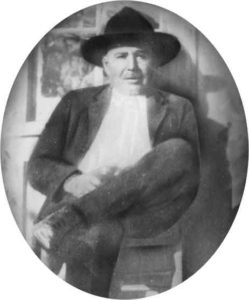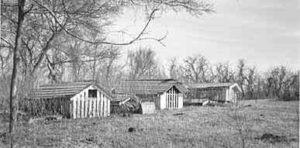Earnest Gouge and his younger brother Jack (more commonly known as Cake Rakko or Big Jack) were full-blood Muscogees born in Indian Territory around the close of the U.S. Civil War.
According to Felix Gouge, Earnest and Jack were abandoned or orphaned as children and taken to Arbeka tribal town in the Muscogee Nation, Indian Territory. Thomas Red, a preacher at Hillabee Baptist Church, adopted the boys and raised them as his own. Though the boys were raised in the church, they began going to ceremonial grounds as soon as they were old enough.
Earnest and Jack married two sisters named Nicey and Lucinda who were residents of Hanna and members of Hillabee Canadian tribal town. Earnest and Nicey had four sons spaced two years apart: Pewter (better known as Kv-Rakko or Big Head), Sam (Same), Fred (Sakco or Crawdad), and Albert (Vlpvtv or Alligator). According to family history, Earnest and Jack were nephews of the famous Opothleyahola (“Old Gouge”), chief of the Upper Creeks from 1828 to 1863
and leader of the northern faction of Creeks during the Civil War.
Earnest and Jack were interested in seeing that the United States lived up to the treaty signed by their uncle. This interest led them to become involved in a group known as the Four Mothers (Ecke Ostat), an early intertribal organization of Creeks, Cherokees, Choctaws, and Chickasaws that continued into the 1940s.
Through collections raised by the Four Mothers, Earnest, Jack, and an interpreter traveled to Washington, D.C. The Creek representatives were given medallions, while the Cherokee representatives were given beaded belts. The medallions and belts had images of clasped hands on them and were thought to serve as keys to the capital.
In 1915 Earnest Gouge was living on his allotment near Hanna, with a small house and barn close to his church (Hillabee Baptist) and tribal town (Hillabee Canadian). Felix Gouge remembers that his grandfather would tell stories while driving or after dinner. In the winters he would fill his stone fireplace with green wood to last the night and sit with his back to the heat while others gathered before him. As an older man he turned to preaching, though he continued to take medicine at his ceremonial ground. A favorite activity was fish-kills, in which fish were drugged and shot with arrows.
Earnest Gouge died at about the age of ninety, after his younger brother Jack. He was hit by a car while riding a horse, finally succumbing to his injuries on September 4, 1955. To the best of our knowledge, these are the only writings he left, though he also dictated three Creek texts about ball-games and his tribal town for Mary R. Haas (Haas 1939). He is buried facing his ceremonial ground.



